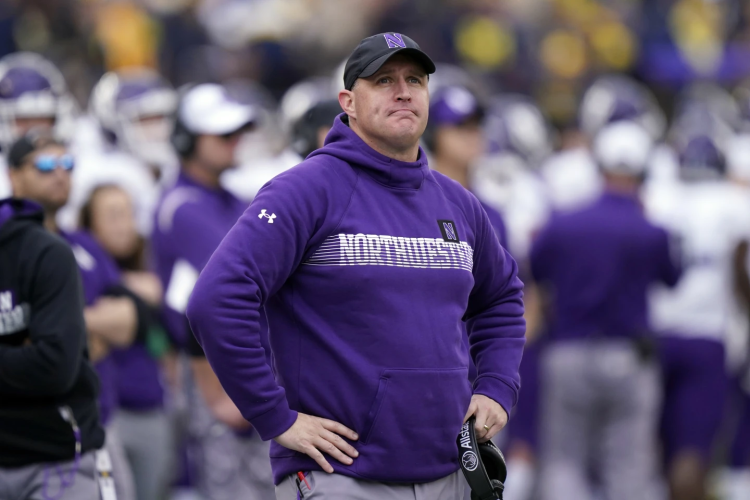Northwestern University, situated in Evanston, Illinois, made the decision to terminate the employment of coach Pat Fitzgerald on Monday following a hazing scandal. This controversy raised doubts about his leadership abilities within the program and caused significant damage to the university’s reputation due to its mishandling of the allegations.
For Fitzgerald, a former All-American linebacker and a key figure in the 1995 Northwestern team that triumphed in the Big Ten and played in the Rose Bowl, this dismissal marks a swift and drastic downfall. He had enjoyed a secure position as the alma mater’s coach, consistently appearing on lists of college coaches with the highest job security.
In an open letter addressed to the university community, Northwestern President Michael Schill emphasized the head coach’s ultimate responsibility for shaping the team’s culture. He acknowledged that the hazing, which was thoroughly investigated, had been pervasive and not a secret within the program. This presented Coach Fitzgerald with an opportunity to become aware of what was happening. Regardless, the culture within Northwestern Football, although commendable in certain aspects, was evidently flawed in others.
After serving as Northwestern’s head coach for 17 seasons, Fitzgerald achieved a record of 110-101. Under his guidance, the Wildcats secured Big Ten West championships in 2018 and 2020 and celebrated five bowl victories. However, the team’s performance declined in his last two seasons, resulting in a 4-20 record.
In a statement provided to ESPN, Fitzgerald expressed his intention to protect his rights through legal means, having instructed his attorney to take the necessary steps.
Northwestern President Schill, in his letter, mentioned that the athletic director, Derrick Gragg, will soon announce the leadership for the upcoming football season. The team’s first game is scheduled for September 3 against Rutgers.
Schill acknowledged that his decision to terminate Fitzgerald would not be universally applauded and anticipated vehement disagreement within the community. Nevertheless, he emphasized that his responsibility as the university’s leader is to act in its best interests, and this decision reflects that duty. The damage inflicted on the institution and the harm caused to some of the students were significant factors in reaching this conclusion.
Gragg, who joined Northwestern in June 2021 as the athletic director, assumed the position following the resignation of Mike Polisky. Polisky stepped down amidst mounting criticism due to his involvement in a sexual harassment lawsuit filed against the university by former Wildcats cheerleaders.
Prior to his dismissal, Fitzgerald had been serving a two-week suspension while an investigation led by attorney Maggie Hickey of law firm ArentFox Schiff was conducted. The investigation concluded that there was insufficient evidence to establish that the coaching staff had knowledge of ongoing hazing, although there were significant opportunities for such information to come to light.
Schill, who previously served as the president of the University of Oregon before assuming the presidency at Northwestern in September, stated in his letter on Monday that the investigative report would be kept confidential. However, he revealed that during the investigation, 11 current or former players admitted to the presence of hazing within the program.
According to Schill, the hazing activities involved forced participation, nudity, and sexually degrading acts, all of which blatantly violated Northwestern’s policies and values.
Fitzgerald, in his statement, maintained that the investigation conducted by Ms. Hickey reaffirmed his lack of knowledge regarding any hazing incidents within the program.
“Last Friday, Northwestern and I reached a mutual agreement regarding the appropriate resolution following Ms. Hickey’s thorough investigation,” Fitzgerald explained. “This agreement entailed a two-week suspension. Therefore, I was taken aback when I discovered that the president of Northwestern unilaterally revoked our agreement without any prior notification and subsequently terminated my employment.”
After Northwestern initially announced Fitzgerald’s suspension, The Daily Northwestern published an article on Saturday that included allegations from a former player, describing specific instances of hazing and sexual abuse. The report also suggested that Fitzgerald “may have known that hazing took place.”
As a result of reflecting on the situation, Schill acknowledged in a letter addressed to the university community that he had focused too much on what the investigative report concluded regarding Fitzgerald’s lack of knowledge, rather than considering what he should have known. Schill expressed his intention to consult with university leadership, members of the board of trustees, and leaders of the faculty senate to determine his next course of action.
Schill emphasized that he had been contemplating the expectations placed on head coaches, faculty members, and campus leaders. This contemplation ultimately led him to make the decision to terminate Fitzgerald.
Due to the confidentiality of the six-month investigation, Schill revealed in Monday’s letter that he had recently learned many of the details. He spoke with the complainant on Sunday after having a conversation with the student’s parents on Friday.
Fitzgerald, who was inducted into the College Football Hall of Fame in 2008, took on the role of head coach at his alma mater in 2006 following the untimely death of then-coach Randy Walker.
Following the announcement of Fitzgerald’s suspension, numerous current and former players rallied to his defense. A letter, circulated on social media and signed by “The ENTIRE Northwestern Football Team” without specifying an author, expressed unwavering support for Fitzgerald, highlighting his consistent prioritization of players’ well-being and development throughout his tenure.
Prior to the official announcement of Fitzgerald’s dismissal, The Daily Northwestern published a report wherein three former Northwestern players described a “culture of enabling racism” within the football program. These revelations added to the existing turmoil surrounding the team.
It is noteworthy that the football program’s troubles emerged at a time when Northwestern unveiled its plans in September to construct a new Ryan Field. The proposed plans entail a modern facility with reduced seating capacity and a stronger focus on enhancing the fan experience.









